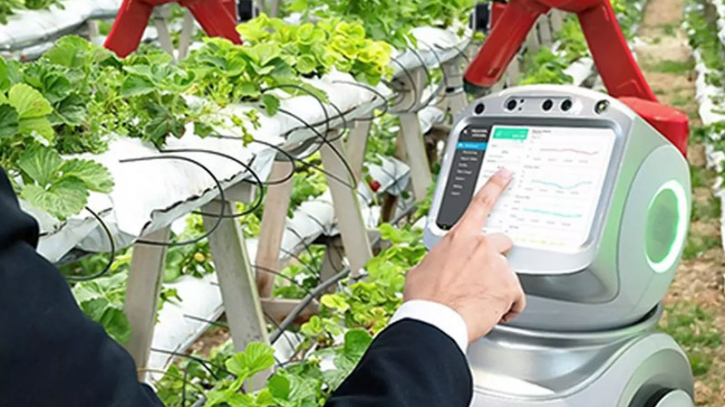Building the agritech renaissance in Bangladesh

Picture this: Rajib, a third-generation small-scale farmer, tending to his crops with weathered hands that bear the marks of countless hours spent nurturing the land. His efforts feed not only his family, but also his community and the nation at large. For generations, farmers like Rajib have endured the unpredictability of nature and markets, grappling with a myriad of challenges. There are days when he must undersell his produce due to the grip of intermediary syndicates. On other occasions, he's forced to discard his hard-earned harvest because the supplier fails to show up for the delivery. Even in his earlier venture into dairy farming, he confronted challenges, from cow health issues to working capital problems.
But today, a new narrative is taking shape, one that holds the promise of agritech.
Rajib's story is not unique. It echoes the lives of millions of farmers who constitute the bedrock of Bangladesh's agricultural sector. This sector plays an indispensable role in the country's economy. In 2021, it contributed 11.63% to Bangladesh's GDP and employed over a third of its population. But this is a sector that transcends numbers; it's about the livelihoods of those who toil under the sun, providing sustenance and serving as a bulwark against the caprices of nature and politics.
These farmers grapple with systemic challenges deeply rooted in the agricultural landscape. The sector is rife with fragmented value chains that leave farmers unprotected on the edge of financial sustainability. Access to quality inputs, from seeds to fertilizers, is constrained, leading to inflated costs and diminished productivity. Smallholder farmers are often excluded from the formal financial system, leaving them vulnerable to high-interest loans. Moreover, the slow adoption of technology has stifled progress and innovation.
In response to these challenges, a wave of innovative agritech startups has emerged, each offering unique solutions to assuage the pain of farmers.
iFarmer
iFarmer has built an ecosystem of services that deals with access to finance, markets, inputs, and advisory for farmers. It connects farmers with investors who provide capital for agricultural projects, empowering small-scale farmers like Rajib to enhance their productivity, improving their income and financial security.
Agroshift
Agroshift sources agricultural produce directly from farmers and sells to micro-retailers and customers, eliminating the intermediaries. This direct linkage ensures that farmers receive fair prices for their produce, thereby receiving increased margin.
Fashol
Fashol connects farmers with retailers and B2B customers, providing a direct market linkage that ensures fair prices for farmers' produce, resulting in increased income and improved market access for agricultural goods.
WeGro
WeGro connects individual and institutional financiers with farmers and their agricultural projects, ensuring a consistent flow of capital for agricultural ventures. This financial support enables farmers to invest in their operations, improving productivity and income.
Green Grocery
Green Grocery is an online grocery seller aspiring to be a leader in the organic food industry in Bangladesh, linking consumers with high-quality, organic products. This platform provides farmers with a market for their organic produce, contributing to increased income and the promotion of sustainable farming practices.
Insurecow
Insurecow offers a 360 degree technology-powered cattle insurance and wellbeing monitoring platform, creating an information chain and diagnosis process connecting farmers and insurance companies. This not only protects farmers from financial losses due to cattle-related issues, but also ensures the overall well-being of their livestock, a critical source of income for many.
These startups exemplify the growth and impact of agritech in Bangladesh's agriculture sector. They address the longstanding challenges of fragmented value chains, access to quality inputs, and financial support, with their tech-enabled solutions.
In a recent webinar organized by the Centre for Enterprise and Society (CES) at ULAB, we brought together founders of agritech startups to delve into the prevailing market pain points and the formidable challenges they face. The panel engaged in a comprehensive dialogue, spanning from the pragmatic aspects of the market to broader systemic challenges.
A consensus emerged among the panelists, highlighting the imperative for sustained support in the form of policy and ecosystem-level interventions to ensure the longevity and success of agritech startups:
- Need for diverse startups: The agritech sector in Bangladesh is relatively nascent, having emerged within the past decade. There is a need for a broader array of startups that address the wider spectrum of agricultural challenges and holistically tackle the problems of farmers. Currently, areas such as AI image sensing, aquaculture, and educational and training solutions are underrepresented in the startup ecosystem. A wider range of diverse startups not only foster competition, but also offer comprehensive solutions to the multifaceted issues of the sector.
- Funding challenges: Funding in general remains a challenge at the ecosystem-level, not limiting to agritech only. Total investments in Bangladeshi food and agriculture startups are estimated at around $14 million. This amount, while significant, falls far short of the sector's true potential, especially when compared to the substantial investments in India and Indonesia along with the weight of Bangladesh’s agricultural importance.
- Collaboration over in-house development: Historically, Bangladesh's corporate culture has favoured in-house solutions and resisted external collaboration. However, this approach often leads to suboptimal outcomes. Local agriculture conglomerates should consider an alternative approach by collaborating with agritech startups. Partnerships with startups bring fresh perspectives and specialized expertise to the table. These collaborations can contribute significantly to the sector's growth, fostering mutually beneficial relationships and driving innovations in agriculture and technology.
- Entry of retail and e-commerce players: Major retail players have recognized the sector's potential, particularly in fresh produce and grocery segments where thin margins are prevalent. Additionally, modern consumers demand high-quality agricultural products, prompting retailers to invest in direct collaboration with farmers. Leading retailers such as Chaldal and Shwapno are investing in partnerships with farmers to secure a stable supply of premium agricultural products. These collaborations bridge the gap between producers and retailers, ensuring high-quality goods are readily available.
- Long-term focus: A sustainable, long-term approach to venture building is essential for agritech startups in Bangladesh. The era of aggressive expansion at any cost is fading, especially in the challenging global investment landscape. Sustainable profitability in the long-run should become a top priority for these startups.
- Depth over breadth: Many agritech companies currently focus on aggregation, but an integrated approach can lead to more effective solutions. Depth, rather than breadth, can better cater to the unique needs of target audiences. It is imperative to avoid spreading resources too thin in pursuit of aggregation.
- Digital literacy: Enhancing digital literacy among farmers is essential to maximize the benefits of agritech. Training and education programs should be implemented to ensure that farmers can effectively utilize technology for their benefit.
In conclusion, agritech is not just a buzzword, but a catalyst for transformation in Bangladesh's agriculture sector. It offers solutions to the systemic challenges that have burdened farmers for generations.
The success of agritech startups is a testament to the sector's potential, but it requires comprehensive and sustained support to ensure its long-term sustainability. As the synergy between agriculture and technology gains momentum, it leads to a brighter, more prosperous future for the nation. Agritech is at the forefront of this renaissance.
Writer: Md Mushfiqur Rahman, Senior Manager, Projects and Research, Centre for Enterprise and Society, ULAB and Sajid Amit, Director, Centre for Enterprise and Society, ULAB.
Source: Dhaka Tribune
.png)




